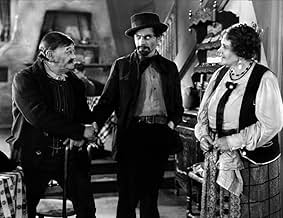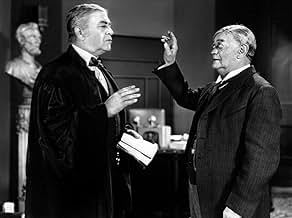Aggiungi una trama nella tua linguaAn immigrant family experiences life in the United States.An immigrant family experiences life in the United States.An immigrant family experiences life in the United States.
- Candidato a 1 Oscar
- 1 vittoria e 1 candidatura in totale
Trama
Lo sapevi?
- QuizFeatures Louise Dresser's only Oscar nominated performance.
- ConnessioniReferenced in The 50th Annual Academy Awards (1978)
Recensione in evidenza
A SHIP COMES IN (Pathe, 1928), directed by William K. Howard, is a sentimental tale of an immigrant family in their newfound land of America. Reminiscent to John Ford's directorial style, though not on a larger scale, A SHIP COMES IN makes up for its lack of top-named actors (by today's standards) with well-constructed story, compliments by Julien Josephson.
The story unfolds in New York harbor where a ship comes in: "Immigrants - hopeful strangers with eyes uplifted toward a vision of homes and happiness - Immigrants." Of the thousands of immigrants coming off the boat, heading for medical inspection before starting their new life on American soil, the main focus turns towards a Hungarian family from Veshala: Peter Placzmik (Rudolph Schildkraut); his wife, "Mama" (Louise Dresser); and their three children, Eric (Milton Holmes); Marthe (Linda Landi) and Katinka (enacted by Virginia Davis as the child and Evelyn Mills as the adult). After acquiring a place to live, in an apartment building five flights up, Peter befriends neighbor, Dan Casey (Lucien Littlefield), who arranges employment for him working as janitor in the federal building, and Sokol (Fritz Feld), a radical who so dislikes the land of opportunity. While brooming the hallway, Peter witnesses Judge Gresham (Robert Edeson) swearing in immigrants as full-fledged citizens of their "adopted country," an honor he will have in five years. After Peter's swearing in as U.S. citizen by his now friend, Judge Gresham, situations begin to occur for the Plecznik family, especially for "Mama" witnessing her 18-year-old son, Eric, becoming a man by enlisting as an Army soldier during the outbreak of the World War, and the arrest and conviction of her husband, a true patriot for his adopted country, for supposedly placing an explosive bomb inside his own cake box intended for Gresham, causing him serious injury and death to his secretary.
Regardless of the plot carried solely by Rudolph Schildkraut's (1862-1930)fine performance, it's Louise Dresser (1878-1965), in a role categorized as secondary, who was singled out by the academy voters as nominee for Best Actress of the year (1927-28), competing with Janet Gaynor for SUNRISE, SEVENTH HEAVEN and STREET ANGEL (Fox Films, 1927-28 respectively) and Gloria Swanson as SADIE THOMPSON (United Artists, 1928). Dresser, losing her statuette to Gaynor, did provide this melodrama with key scenes worth nothing, mainly that her reaction as her son goes off to war, and suffering moments as her husband gets hauled off to prison after being found "guilty" for a crime for which he is innocent. As for Rudolph Schildkraut (short man with round face), he's most noted as the father of stage and screen actor, Joseph Schildkraut (tall with John Barrymore profile), than for his brief Hollywood film roles of the late 1920s. Also listed in the cast is Louis Natheaux appearing as Gregor.
As with most silent films released during its final years (1928-29) before its conversion to sound, then known as "talkies," A SHIP COMES IN is virtually forgotten, even by film historians. Whether the movie has ever been televised or not is uncertain, but is it certain that it was formerly available on home video around the 1990s by a distribution company called Grapevine Video. Along with the former Blackhawk Video of the 1980s and 90s, Grapevine, in its heyday, was the home to its large selection of famous and obscure silent movies such as this one. While the Grapevine label lists A SHIP COMES IN at 94 minutes, the existing print, equipped with fair organ scoring, runs 70 minutes, long enough for a good story and short enough to hold interest. (***)
The story unfolds in New York harbor where a ship comes in: "Immigrants - hopeful strangers with eyes uplifted toward a vision of homes and happiness - Immigrants." Of the thousands of immigrants coming off the boat, heading for medical inspection before starting their new life on American soil, the main focus turns towards a Hungarian family from Veshala: Peter Placzmik (Rudolph Schildkraut); his wife, "Mama" (Louise Dresser); and their three children, Eric (Milton Holmes); Marthe (Linda Landi) and Katinka (enacted by Virginia Davis as the child and Evelyn Mills as the adult). After acquiring a place to live, in an apartment building five flights up, Peter befriends neighbor, Dan Casey (Lucien Littlefield), who arranges employment for him working as janitor in the federal building, and Sokol (Fritz Feld), a radical who so dislikes the land of opportunity. While brooming the hallway, Peter witnesses Judge Gresham (Robert Edeson) swearing in immigrants as full-fledged citizens of their "adopted country," an honor he will have in five years. After Peter's swearing in as U.S. citizen by his now friend, Judge Gresham, situations begin to occur for the Plecznik family, especially for "Mama" witnessing her 18-year-old son, Eric, becoming a man by enlisting as an Army soldier during the outbreak of the World War, and the arrest and conviction of her husband, a true patriot for his adopted country, for supposedly placing an explosive bomb inside his own cake box intended for Gresham, causing him serious injury and death to his secretary.
Regardless of the plot carried solely by Rudolph Schildkraut's (1862-1930)fine performance, it's Louise Dresser (1878-1965), in a role categorized as secondary, who was singled out by the academy voters as nominee for Best Actress of the year (1927-28), competing with Janet Gaynor for SUNRISE, SEVENTH HEAVEN and STREET ANGEL (Fox Films, 1927-28 respectively) and Gloria Swanson as SADIE THOMPSON (United Artists, 1928). Dresser, losing her statuette to Gaynor, did provide this melodrama with key scenes worth nothing, mainly that her reaction as her son goes off to war, and suffering moments as her husband gets hauled off to prison after being found "guilty" for a crime for which he is innocent. As for Rudolph Schildkraut (short man with round face), he's most noted as the father of stage and screen actor, Joseph Schildkraut (tall with John Barrymore profile), than for his brief Hollywood film roles of the late 1920s. Also listed in the cast is Louis Natheaux appearing as Gregor.
As with most silent films released during its final years (1928-29) before its conversion to sound, then known as "talkies," A SHIP COMES IN is virtually forgotten, even by film historians. Whether the movie has ever been televised or not is uncertain, but is it certain that it was formerly available on home video around the 1990s by a distribution company called Grapevine Video. Along with the former Blackhawk Video of the 1980s and 90s, Grapevine, in its heyday, was the home to its large selection of famous and obscure silent movies such as this one. While the Grapevine label lists A SHIP COMES IN at 94 minutes, the existing print, equipped with fair organ scoring, runs 70 minutes, long enough for a good story and short enough to hold interest. (***)
I più visti
Accedi per valutare e creare un elenco di titoli salvati per ottenere consigli personalizzati
Dettagli
- Tempo di esecuzione1 ora 10 minuti
- Colore
- Mix di suoni
- Proporzioni
- 1.33 : 1
Contribuisci a questa pagina
Suggerisci una modifica o aggiungi i contenuti mancanti

Divario superiore
By what name was A Ship Comes In (1928) officially released in Canada in English?
Rispondi























